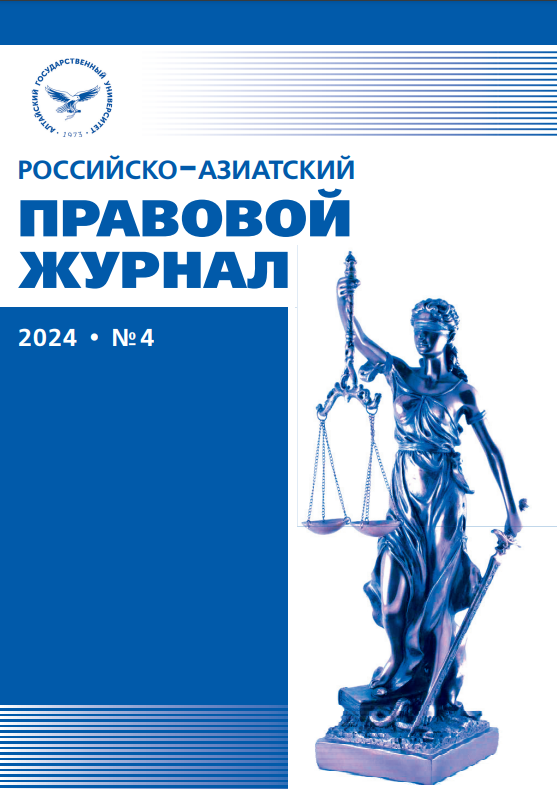SUBJECT COMPOSITION OF LEGAL RELATIONSHIP (LOGICAL–LINGUISTIC PHENOMENON)
УДК 340.113 ББК 67.041
Abstract
This article provides a comparative analysis of the linguistic features of the use of terms denoting thesubject of law. Since the Russian legal doctrine defines the subject differently, a similar pattern has beenidentified abroad. A conclusion has been made about the need to form a single comprehensive approach todefining the subject of law to update the general theory of law in the modern realities of the informationsociety.
Downloads
References
Алексеев С.С. Механизм правового регулирования в социалистическом государстве. 2-е изд. 1966. 187 с.
Василевская Л.Ю., Подузова Е.Б., Тасалов Ф.А. Цифровизация гражданского оборота: правовая характеристика «искусственного интеллекта» и «цифровых субъектов» (цивилистическое исследование) : монография: в 5т. Т. III / отв. ред. Л. Ю. Василевская. М. : Проспект, 2023. 286 с.
Орзих М.Ф. Личность и право. М. : Юрид. лит., 1975. 112 с.
Шафиров В.М. Теория права: человекоцентристский подход: научное, учебное, практикоориентированное пособие. М. : Проспект. 2024. 464с.
Dun F.V. The logic of law. Vol. 1, Art. No. 36 (2009). Р. 1–55.
Wendt A. Why a World State is Inevitable // European Journal of International Relations, 9 (2003). P. 491–542.
Wendt A. The State as Person in International Theory // Review of International Studies, 30 (2004). P. 289–316.
Комаров С.А. Советское общенародное государство и личность: Политико-правовые аспекты. Красноярск : Изд-во Красноярского ун-та. 1986. 136 с.
Copyright (c) 2024 Н.Е. Коваленко

This work is licensed under a Creative Commons Attribution 4.0 International License.
Russian-Asian Law Journal is a golden publisher, as we allow self-archiving, but most importantly we are fully transparent about your rights.
Authors may present and discuss their findings ahead of publication: at scientific conferences, on preprint servers, in public databases, and in blogs, wikis, tweets, and other informal communication channels.
Russian-Asian Law Journal allows authors to deposit manuscripts (currently under review or those for intended submission) in non-commercial, pre-print servers such as ArXiv.
Authors who publish with this journal agree to the following terms:
- Authors retain copyright and grant the journal right of first publication with the work simultaneously licensed under a Creative Commons Attribution License that allows others to share the work with an acknowledgement of the work's authorship and initial publication in this journal.
- Authors are able to enter into separate, additional contractual arrangements for the non-exclusive distribution of the journal's published version of the work (e.g., post it to an institutional repository or publish it in a book), with an acknowledgement of its initial publication in this journal.
- Authors are permitted and encouraged to post their work online (e.g., in institutional repositories or on their website) prior to and during the submission process, as it can lead to productive exchanges, as well as earlier and greater citation of published work (See The Effect of Open Access).








